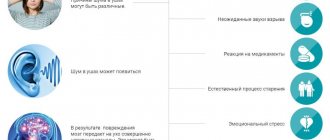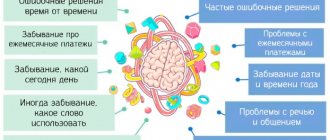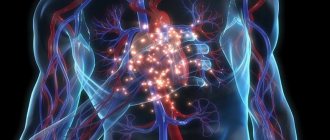Quite a significant number of people from time to time face such a problem as a feeling of pressure in the ears. According to some sources, at least 20-30% of the world's population has experienced this sensation at least once for no apparent reason. Anyone can experience this pain syndrome - the likelihood of its occurrence practically does not depend on age or gender, nor on social status or financial condition.
If we do not take into account the natural cases of the occurrence of this pressure - when flying on an airplane, diving to great depths, sudden rises to altitude, and so on, then the occurrence of this symptom is a sign of a person’s existing health problems. It is worth noting that the occurrence of pressure in the ear does not mean at all that the problem is associated with this organ - simply all the systems of our body are interconnected and the symptom of the disease can manifest itself in this way.
Isolated cases of feeling pressure in the ears may not be a sign of pathology, but they should not be completely ignored either. If you experience these sensations regularly, and are also accompanied by other alarming symptoms (head pain, nosebleeds, dizziness, nausea, weakness, etc.), then delaying a visit to the doctor is simply unacceptable. A combination of several symptoms or multiple repetitions of one - these cases undoubtedly require examination and an accurate diagnosis.
Symptoms
When visiting a doctor about pressure in the ears, some patients mention other symptoms accompanying this sensation:
- dizziness;
- ear congestion;
- associated pressure in the head;
- various noises of varying degrees of volume (ringing, clicking, hum, etc.);
- acoasmas (auditory non-speech hallucinations);
- nausea and headaches;
- increased sensitivity to sounds or light.
The presence of these additional symptoms gives the doctor reason to suspect a serious illness and suggest that the patient undergo a comprehensive examination. An otolaryngologist can also offer consultations with other specialists, since the alleged ailments may not be within his competence.
Presses and bursts in the ears
Marina
1294 views
December 18, 2020
Hello! Please help me figure it out. 3.12 I had a pain in my neck/back of my head (the pain was not acute, but it felt like I was sleeping uncomfortably) There were no problems with my neck before. On December 5, a sore throat was added, the tonsils were enlarged, and the temperature was 37.2. I immediately started treating with Hexoral, Faringosept, Tonsilgon, and salt/soda rinses. There was no runny nose, but after sleep there was congestion in one or the other nostril. On the trail. day there was a feeling of tightness in the throat/neck, stuffy ears. 7.12 I went to see a therapist. Swallowing was no longer painful, but my throat was still bad. The doctor added the antibiotic Flemoxin for 5 days and injections of Neuromultivit and Xefocam, and said that if the sensations in the neck and ears do not go away, then start Mexidol 3 times a month. 9.12 I turned to Laura: my ears are clean, I have a sore throat. I sent him to donate blood and a throat swab. I took the antibiotic on the 4th day. The blood is good. The smear is clean, only Candida 10b3. After the injections, my neck stopped hurting and the tightness in my neck/throat went away, but my ears and head felt full. I started Mexidol 11.12. On the 3rd day of taking it, dry mouth appeared, I lost my appetite and began to feel sick and have a headache. Canceled it. 15.12 I felt worse, severe weakness, temperature every day was 37.2 for all 2 weeks, my head ached as if it were clamped in a vice, my ears were not stuffed up, but seemed to be bursting and pressing from the inside (like hot flashes, it starts to press and then goes away, especially if you close your ears and open them ) there is also pressure in the head and face (temples, ear area, between the eyebrows, in the nose and on both sides of the nose). 16.12 Lora is back again, her throat is better, but still swollen, her ears are fine and this time she looked in her nose. Swelling in the nose. She sent me for an x-ray of the sinuses and at the same time the cervical calving. Results: osteochondrosis was ruled out, the neck was fine. And in the nose there is a parietal thickening of the mucous membrane of the maxillary sinuses. The doctor again ordered me to drink a/b for another 5 days + Isofra + nasal prom-e Aquamaris + Imudon. All this time I thought that I had a sore throat + SCH and something with the blood vessels. The neurologist said that everything was fine in her area and further examination. did not appoint. For today. The day became easier, there was no fever, after rinsing the nose, the pressure on the forehead and nose stopped, and the ears were bursting. It turns out there is no osteochondrosis? Please comment on my condition and how adequate is the treatment? What else can I do to get better? I'm very worried about my ears, I'm already starting to panic
The question is closed
angina
neurologist
cervical osteochondrosis
stuffy ears
feeling of tightness
Causes
Pressure in the ears occurs due to a number of factors and ailments. These may include serious illnesses and completely harmless ones, for example, prolonged listening to music at high volumes in headphones. The most common causes of pressure in the ears are:
- otosclerosis (bone growth) and inflammation in the middle ear;
- pathologies of a neurological nature (cervical osteochondrosis, pinched vertebrae)
- atherosclerosis of blood vessels in the brain;
- high/low blood pressure of various etiologies (obesity, alcohol and tobacco abuse, depression, stress, heart problems, physical exercise, vascular disorders, etc.);
- injuries of the skull, head;
- tumor (acoustic neuroma) of the auditory nerve;
- otitis, sinusitis, rhinitis, earwax, aerootitis;
- everyday (natural) reasons - long telephone conversations, sleep disturbances, prolonged listening to music, overwork, sudden changes in atmospheric pressure, water getting into the ears, flying on an airplane, diving, etc.
Diagnostic methods
If the patient often suffers from headaches and stuffy ears, it is necessary to contact us for a full examination. A simple examination will only indicate visible deviations from the norm, therefore, to understand a more accurate picture, additional techniques are prescribed:
- tonometry – blood pressure measurement;
- MRI of the head and cervical spine is one of the most informative diagnostic methods, which will indicate hidden disorders and neoplasms;
- blood tests - prescribed to determine the causative agent of bacterial diseases, as well as to assess hormonal balance;
- additional methods for diagnosing diseases of the hearing organ, including audoscopy, smear tests, and ultrasound examination.
The Clinical Brain Institute has modern equipment for diagnosing diseases that are accompanied by headaches and ear congestion. Here you can quickly and accurately determine the underlying disease that causes deterioration in well-being.
Treatment
Obviously, treatment for ear pressure can only begin after a diagnosis has been made. Until the cause is identified, the otolaryngologist is unlikely to be able to prescribe medications or take any other action. In addition, if the cause of the disease is beyond his competence, then it will not be possible to do without the help of an appropriate specialist (therapist, surgeon, neurologist, etc.).
The reception is conducted by specialists
Kirillov Evgeniy Sergeevich
Audiologist
Cost of services
Initial consultation with an audiologist
1200₽
Repeated consultation with an audiologist
1000₽
Treatment of headaches and ear congestion
Treatment tactics are selected individually, depending on the cause of the headache and ear congestion, as well as the patient’s age, concomitant diseases and other factors. To eliminate both the root cause and symptoms of diseases, the following methods can be proposed:
- antibiotic therapy is the main stage in the treatment of bacterial inflammatory processes, as well as the prevention of purulent complications;
- symptomatic treatment , which includes anti-inflammatory, painkillers, ear drops;
- surgical methods - necessary to remove sulfur plugs, neoplasms, as well as to extract the contents of the paranasal sinuses for sinusitis;
- physiotherapy – prescribed for chronic ENT diseases.
Doctors at the Clinical Institute of the Brain prescribe a minimum of therapeutic techniques that will bring maximum results. Here are specialists of a wide and narrow profile with many years of experience in treating various diseases that manifest themselves as headaches and hearing impairment.
How does tinnitus manifest?
Structure of the Ear Tinnitus can also be described as ringing, rustling, creaking or buzzing in the ears.
In most cases, tinnitus does not interfere with normal life. At the same time, the symptom may intensify. Doctors distinguish four degrees of tinnitus (depending on the patient’s condition):
- first degree – tinnitus does not affect a person’s well-being;
- second degree – noise causes discomfort in quiet conditions and interferes with sleep;
- third degree - discomfort from tinnitus is constantly felt, the person does not get enough sleep, the quality of life deteriorates significantly;
- fourth degree - tinnitus creates unbearable discomfort.
An important point: noise is felt in one or both ears. Noise in one ear is caused by a local cause; if there is noise in both ears at once, then the problem is most likely systemic in nature.
It is also important what other symptoms are observed along with tinnitus. For example, is tinnitus accompanied by hearing loss (hearing loss). Sometimes tinnitus is accompanied by symptoms such as headache, dizziness, and nausea.
When should you see a doctor if you have tinnitus?
Noise in ears
If you begin to hear tinnitus, that is, if it appears and does not go away, you need to see a doctor and find out its cause in order to exclude the development of the most dangerous diseases.
You should definitely consult a doctor if you experience the following along with tinnitus:
- hearing loss;
- neurological symptoms (dizziness, loss of coordination, nausea, vomiting);
- severe headache or pain in the heart area.
You should also see a doctor if the intensity of the noise increases (if the tinnitus is causing a deterioration in your quality of life).
Therapy methods
Having found out why the patient has pressure on his ears, the doctor develops a treatment regimen.
It all depends on the true causes of the pathological process. For high blood pressure, which can cause severe headaches and stuffy ears, Captopril helps. Nootropic drugs are also used that strengthen the walls of blood vessels and normalize blood circulation: Vertizin, Disiron. Osteochondrosis requires complex treatment using ointments and creams (Diclac gel, Clodifen, Diclofenac), anti-inflammatory drugs, Noofen, which improves cerebral circulation, drugs that strengthen blood vessels, for example, Ginkgo Biloba. When the cause of the malaise is sinusitis, the patient is prescribed a procedure for clearing the nasal passages of accumulated pus, which is called “cuckoo”. In severe cases, the nasal septum is punctured or a Yamik catheter is inserted. In addition to treatment, antibacterial drugs are prescribed, for example, Zinnat, Amoxil, vasodilating drops, and herbal medicines.
Purulent otitis media is treated with antibiotics for both internal and external use. The patient drinks pills, drips medicine into his ears, and takes vitamins. In case of atherosclerotic changes, thinning medications (Aspirin) are prescribed, as well as drugs that reduce the risk of blood clots (Wobenzym). Migraine attacks cannot be cured, but they can be controlled with painkillers. It is important to take the pill at the very beginning of the headache, otherwise it will not help the patient.
When is it due to nerves?
At the time of panic attacks or as they approach, patients often experience increased blood pressure, which can cause severe discomfort in the ears, temples and head. It is known that hypertension provokes the occurrence of severe spasms.
We recommend that you read: What is depersonalization?
Often, floaters appear before the eyes - various spots, stripes, dots.
Other accompanying symptoms include:
- tachycardia, interruptions, body tremors, fever or chills;
- respiratory disorders (shortness of breath, suffocation);
- frequent urination;
- pain, tension, tightness in the chest area;
- nausea, diarrhea;
- the appearance of red spots on the skin, “nervous” allergies;
- numbness of the limbs.
Prevention methods
At home, you should follow simple recommendations from doctors. They will help prevent the development of diseases that cause headaches, ear congestion and general deterioration in well-being. The set of preventive measures includes:
- protection of the head and ears from hypothermia;
- proper nutrition with enough vitamins at any time of the year;
- timely treatment of colds.
The Clinical Brain Institute offers all the conditions for high-quality and comfortable treatment of disorders that cause headaches and ear congestion. There is also timely equipment located here, thanks to which you can quickly and accurately determine the cause of poor health and make an accurate diagnosis.










